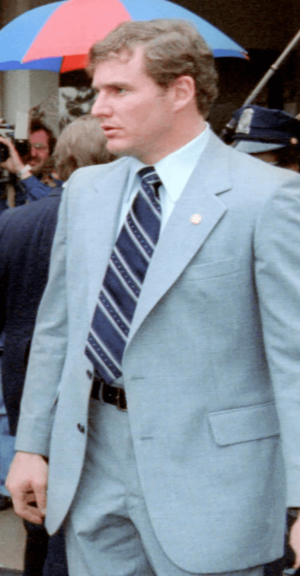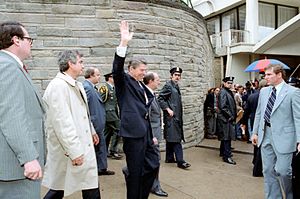Tim McCarthy facts for kids
Quick facts for kids
Tim McCarthy
|
|
|---|---|

McCarthy in 1981, moments before the shooting
|
|
| Born |
Timothy J. McCarthy
June 20, 1949 |
| Alma mater | University of Illinois (BS) Lewis University (MS) |
| Occupation | Secret Service special agent Chief of police |
| Known for | Saving President Reagan during his assassination attempt |
| Children | 3 |
Timothy J. McCarthy (born June 20, 1949) is an American who used to be a police officer and a special agent for the U.S. Secret Service. He is famous for protecting then-President Ronald Reagan during an attack on Reagan's life. This happened on March 30, 1981, in Washington, D.C..
During the attack, McCarthy bravely stepped in front of President Reagan. He took a bullet to his chest to shield the President. Luckily, he made a full recovery. After this heroic act, McCarthy was celebrated as a hero. He received the NCAA Award of Valor in 1982.
Contents
Early Life and Education
Timothy McCarthy was born on June 20, 1949. He grew up in Chicago, Illinois. He went to St. Denis Grammar School and Leo Catholic High School. After high school, he attended the University of Illinois at Urbana-Champaign.
He joined the Fighting Illini football team as a "walk-on" player. This means he joined without a scholarship at first. He later earned a scholarship and played as a strong safety. An injury ended his college football career early. He was also a member of the Delta Tau Delta group.
Career in Law Enforcement
McCarthy worked for the United States Secret Service for 22 years. Eight of those years were spent protecting presidents in Washington, D.C.. For 14 years, he worked as a criminal investigator in Chicago. From 1989 until he retired in October 1993, McCarthy was the special agent in charge of the Secret Service's Chicago office.
Protecting President Reagan
On March 30, 1981, a man named John Hinckley Jr. fired shots at President Ronald Reagan. This happened as the President was leaving the Washington Hilton Hotel. Six bullets were fired very quickly. As another agent, Jerry Parr, quickly pushed President Reagan into his car, McCarthy acted fast. He spread his body in front of Reagan to become a shield.
McCarthy was hit in the chest by one of the bullets. The bullet went through his right lung, diaphragm, and part of his liver. He was not wearing a bulletproof vest at the time.
Interestingly, McCarthy was not supposed to be working that day. The Secret Service needed an officer for an event the next day. McCarthy and a colleague flipped a coin to see who would work on their day off. McCarthy lost the coin toss.
He was taken to George Washington University Hospital and had surgery. He recovered fully and was released from the hospital.
After the Secret Service
After leaving the Secret Service, Timothy McCarthy became the Chief of the Orland Park Police Department in May 1994.
He continued his education, earning a Bachelor of Science degree in Finance from the University of Illinois at Urbana-Champaign. He also earned a Master of Science degree in Criminal/Social Justice from Lewis University.
In March 2016, he received the first-ever Chief of Police of the Year award. This award was given by the Illinois Association of Chiefs of Police. He was recognized for many things, including helping to build the first police station in the country to get a special "LEED Gold" certification for being environmentally friendly. He also helped create a task force to solve major crimes and promoted training for officers to help people in crisis.
From July 2016 to April 2017, he served as the acting village manager for Orland Park. He also worked as a corporate vice president for a security systems company. He often gave speeches at schools and events, sharing his experiences as a Secret Service Agent.
Timothy McCarthy announced his retirement on July 1, 2020. His retirement became official on August 1, 2020.
Personal Life
Timothy McCarthy and his wife were married for 47 years when he retired in 2020. They have three children.
In 2016, McCarthy was asked about John Hinckley Jr., the person who shot President Reagan. McCarthy said he understood the decision to release Hinckley, even if he didn't fully agree. He hoped it was the right decision for everyone's safety.
 | Delilah Pierce |
 | Gordon Parks |
 | Augusta Savage |
 | Charles Ethan Porter |


